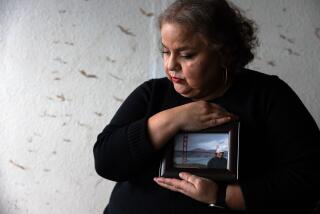A Red-Tape Tragedy
- Share via
She first came to America to visit. She returned for love.
Now Jasmin Salehi may be forced out of her adopted country in sorrow: The South Korean woman is apparently not eligible to live in the United States because she had not been married long enough to her husband when he was shot to death by a robber.
“I didn’t have two years,” Salehi said, referring to the immigration marriage rule that may send her away. “My husband was murdered. What should I do?”
The union of Jasmin and Cyrus Salehi was the type that immigration law was written to protect. Rather than a marriage of convenience, it was, from all indications, an American love story.
Unfortunately, there is simply no clause in the immigration statutes to allow for this distinctly American tragedy. In February, a man walked into the Denny’s restaurant in Reseda where her husband of 11 months was managing the graveyard shift. He demanded money. Cyrus Salehi handed over $400 from the cash register. The gunman fired anyway.
The Immigration and Naturalization Service requires legal immigrants such as Salehi to be married two years before they are eligible for permanent resident status. Salehi may be asked to leave the country before her husband’s accused killer goes to trial this fall.
“The law just does not provide for her situation,” said David Gulick of the INS’ Los Angeles district office. “If the marriage is less than 2 years old when the citizen dies, the petition [for residency] dies with the citizen.”
Salehi, whose given name is Maihoa Joo, met her husband at a downtown Denny’s restaurant in August 1993.
Then a resident of Seoul, she was in Los Angeles visiting her sister, who was a student at a local fashion design school. They went to brunch at the restaurant, where Salehi was noticed by the handsome Iran-born Cyrus Salehi, who earned his U.S. citizenship in 1995 after 20 years as a legal resident.
“He was looking at me,” she said.
When they finished eating, Salehi, prompted by her sister, went to the counter to pay the bill. A grinning Cyrus spoke to her in broken Korean. She couldn’t understand him. He repeated the words as best he could: “You’re pretty.”
“On that day, he used all the Korean words he knows,” Salehi said in the Van Nuys home she had shared with her husband. It is a small house, decorated throughout with wedding photos and ornaments from the reception.
The house is now in foreclosure. She cannot make the mortgage payments on her salary as a production manager for a downtown Los Angeles clothing manufacturer, she said.
She is also part owner of the Denny’s where Cyrus was shot. They had a joint savings account. They were partners, she said, in her barely audible voice. Theirs was a marriage of love.
After dating a month, during the summer of 1993, she flew home. He wrote love letters--his first ever, he had told her. Three months later, she returned on a visitor’s visa, staying with her sister but spending most of her time with Cyrus.
When the Northridge earthquake struck, Cyrus’ Van Nuys house was badly damaged. But he left immediately and, through the sirens and fires and twisted freeways, made his way to her downtown apartment.
“That’s the day I decided he was the right one,” she said.
Technically, the two were married March 20, 1995, in Las Vegas. But the real wedding came in August of that year, at the reception.
Cyrus’ mother, whom he had not seen in 14 years, was granted a travel visa by Iranian officials and arrived from Tehran with suitcases full of traditional wedding decorations. Salehi’s sister, the sister’s two children and a friend all came from South Korea to join the 100-strong wedding party that lasted all day.
Salehi has volumes of wedding photos. In some pictures, they are dressed in Western-style wedding wear. In others, they are wearing traditional Korean wedding clothes.
If she leaves the United States to visit his grave, she would not be let back in.
In August, Jasmin Salehi went to the INS office for an interview that had been scheduled more than a year before because of the backlog of cases at the INS district office in Los Angeles. Had her husband been there, she would probably have been granted conditional resident status. Two years after that, she would have been eligible for permanent residency.
“They asked me, ‘Where is your husband?’ ” she said. “I told them my husband was murdered. They explained to me, ‘You’re not married two years. Sorry.’ ”
The offices of Sen. Dianne Feinstein and U.S. Rep. Anthony C. Beilenson (D-Woodland Hills) have both written to the INS asking the agency to see if Salehi qualifies for residency under any other provisions.
Los Angeles County Deputy Dist. Atty. Shellie Samuels has also written in support of Salehi, saying she could be called to testify in the trial of her husband’s accused killer.
Unfortunately, Salehi seems to have no obvious legal protection, said Encino immigration attorney Richard Tasoff.
Salehi now awaits a certified letter from the INS. When it arrives, she will have 30 days to leave the country, or face deportation.
“I don’t want to go back to Korea,” she said, crying. “I don’t have anything there. I just want to live over here because this is my home sweet home with my husband.”
More to Read
Sign up for Essential California
The most important California stories and recommendations in your inbox every morning.
You may occasionally receive promotional content from the Los Angeles Times.













